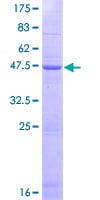Recombinant Human PMS2 protein (ab166543)
Key features and details
- Expression system: Wheat germ
- Tags: GST tag N-Terminus
- Suitable for: ELISA, WB
Description
-
Product name
Recombinant Human PMS2 protein
See all PMS2 proteins and peptides -
Expression system
Wheat germ -
Protein length
Full length protein -
Animal free
No -
Nature
Recombinant -
-
Species
Human -
Sequence
MFAEMEIIGQFNLGFIITKLNEDIFIVDQHATDEKYNFEMLQQHTVLQGQ RLIAPQTLNLTAVNEAVLIENLEIFRKNGFDFVIDENAPVTERAKLISLP TSKSWTFGPQDVDELIFMLSDSPGVMCRPSRVKQMFASRACRKSVMIGTA LNTSEMKKLITHMGEMDHPWNCPHGRPTMRHIANLGVISQN -
Amino acids
1 to 191 -
Tags
GST tag N-Terminus
-
Specifications
Our Abpromise guarantee covers the use of ab166543 in the following tested applications.
The application notes include recommended starting dilutions; optimal dilutions/concentrations should be determined by the end user.
-
Applications
ELISA
Western blot
-
Form
Liquid -
Additional notes
-
 Concentration information loading...
Concentration information loading...
Preparation and Storage
-
Stability and Storage
Shipped on dry ice. Upon delivery aliquot and store at -80ºC. Avoid freeze / thaw cycles.
pH: 8.00
Constituents: 0.31% Glutathione, 0.79% Tris HCl
General Info
-
Alternative names
- DNA mismatch repair gene homologue
- DNA mismatch repair protein PMS2
- H_DJ0042M02.9
see all -
Function
Component of the post-replicative DNA mismatch repair system (MMR). Heterodimerizes with MLH1 to form MutL alpha. DNA repair is initiated by MutS alpha (MSH2-MSH6) or MutS beta (MSH2-MSH6) binding to a dsDNA mismatch, then MutL alpha is recruited to the heteroduplex. Assembly of the MutL-MutS-heteroduplex ternary complex in presence of RFC and PCNA is sufficient to activate endonuclease activity of PMS2. It introduces single-strand breaks near the mismatch and thus generates new entry points for the exonuclease EXO1 to degrade the strand containing the mismatch. DNA methylation would prevent cleavage and therefore assure that only the newly mutated DNA strand is going to be corrected. MulL alpha (MLH1-PMS2) interacts physically with the clamp loader subunits of DNA polymerase III, suggesting that it may play a role to recruit the DNA polymerase III to the site of the MMR. Also implicated in DNA damage signaling, a process which induces cell cycle arrest and can lead to apoptosis in case of major DNA damages. -
Involvement in disease
Defects in PMS2 are the cause of hereditary non-polyposis colorectal cancer type 4 (HNPCC4) [MIM:600259]. Mutations in more than one gene locus can be involved alone or in combination in the production of the HNPCC phenotype (also called Lynch syndrome). Most families with clinically recognized HNPCC have mutations in either MLH1 or MSH2 genes. HNPCC is an autosomal, dominantly inherited disease associated with marked increase in cancer susceptibility. It is characterized by a familial predisposition to early onset colorectal carcinoma (CRC) and extra-colonic cancers of the gastrointestinal, urological and female reproductive tracts. HNPCC is reported to be the most common form of inherited colorectal cancer in the Western world, and accounts for 15% of all colon cancers. Cancers in HNPCC originate within benign neoplastic polyps termed adenomas. Clinically, HNPCC is often divided into two subgroups. Type I: hereditary predisposition to colorectal cancer, a young age of onset, and carcinoma observed in the proximal colon. Type II: patients have an increased risk for cancers in certain tissues such as the uterus, ovary, breast, stomach, small intestine, skin, and larynx in addition to the colon. Diagnosis of classical HNPCC is based on the Amsterdam criteria: 3 or more relatives affected by colorectal cancer, one a first degree relative of the other two; 2 or more generation affected; 1 or more colorectal cancers presenting before 50 years of age; exclusion of hereditary polyposis syndromes. The term 'suspected HNPCC' or 'incomplete HNPCC' can be used to describe families who do not or only partially fulfill the Amsterdam criteria, but in whom a genetic basis for colon cancer is strongly suspected.
Defects in PMS2 are a cause of mismatch repair cancer syndrome (MMRCS) [MIM:276300]; also known as Turcot syndrome or brain tumor-polyposis syndrome 1 (BTPS1). MMRCS is an autosomal dominant disorder characterized by malignant tumors of the brain associated with multiple colorectal adenomas. Skin features include sebaceous cysts, hyperpigmented and cafe au lait spots. -
Sequence similarities
Belongs to the DNA mismatch repair mutL/hexB family. -
Cellular localization
Nucleus. - Information by UniProt
Images
Protocols
To our knowledge, customised protocols are not required for this product. Please try the standard protocols listed below and let us know how you get on.
Datasheets and documents
-
Datasheet download
References (0)
ab166543 has not yet been referenced specifically in any publications.
